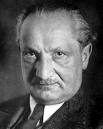Adam Kirsch, the poetry critic, has a good take-down of Emmanuel Faye’s Heidegger: The Introduction of Nazism Into Philosophy in today's New York Times Book Review. Faye's hatchet job on Heidegger has received a great deal of unwarranted attention in US academic circles and has led to calls to remove Heidegger's books from library shelves, or,perhaps, to burn them in politically correct bonfires. Kirsch quite correctly has harsh criticism for Faye's shoddy scholarship:
"Yet the seminars and speeches Faye analyzes date mainly from the period
1933-35 — that is, the year of Heidegger’s rectorship and just
afterward, when his Nazism was flagrant. To show that he remained a
Nazi until 1945, or even for the rest of his life, would require
finding similar kinds of propaganda in Heidegger’s work throughout
those years. But unlike the seminars Faye has unearthed, Heidegger’s
writing from that later period is well known; and aside from a few
notorious instances, overt Nazi rhetoric simply isn’t there."
Heidegger's central work Sein und Zeit was published 7 years prior to the Nazi seizure of power – an inconvenient fact for Faye:
"But the weakness of this inference only underscores the problems with
Faye’s overall case. What Faye really wants is not to make us think
about Heidegger differently, but to excuse us from having to think
about him at all, by expelling him from the ranks of the philosophers
into the cesspool where Nazi ideologues like Alfred Rosenberg dwell.
“In the work of Martin Heidegger,” Faye concludes, “the very principles
of philosophy are abolished.”
Unfortunately Kirsch doesn't discuss Heidegger's philosophy or really attack Faye's central thesis that Nazism is the logical conclusion of Heidegger's thinking. Rather, Kirsch bases his defense on Hannah Arendt's reconciliation with the philosopher – Arendt being more familiar territory.
34 years after his death, Heidegger still elicits strong emotions – both for and against. The filmmaker Jeffrey van Davies describes the scene at the University of Freiburg (where Heidegger served as rector in the Third Reich) upon his showing the documentary film Only a God Can Save Us:
The Heidegger family came and caused quite an incident. Hermann
Heidegger kept yelling out during the film “Lüge, alles Lüge.” (Lies,
all lies!”) and “nicht Wahr!” (“not true!”). People began yelling back
at him to shut up. During the postfilm panel discussion which included
Hugo Ott, Bernd Martin, Rainer Marten, Silke Seemann, Tom Rockmore and
myself, Herman Heidegger insisted on coming up to the podium to speak.
We said yes and even helped him up the steps to the stage. He is over
90 and recently had a serious cancer operation. He immediately began to
attack the Freiburg philosophers and historians on the stage and myself
for our lies and deceit. Things almost got out of hand with people from
the audience yelling “Nazi” at Heidegger. After the discussion the
Heidegger family descended upon me with all their complaints and
criticism.
Van Davies sees a lack of Vergangenheitsbewältigung ("coming to terms with history") in the Freiburg academic community with respect to Heidegger:
Frankly I could write a book about the city of Freiburg and how it has
tried to deal with the Heidegger scandal, the whole Nazi past. There
are powerful Freiburg families some affiliated with the university who
have swept a lot under the rug in part because many members of these
families were enthusiastic Nazis themselves. There were so many records
and documents destroyed or stolen from the university archives,
libraries, etc. Hugo Ott told me that many times files would be missing
in the archive, yet he knew which families had taken them and he was
able to get some of his information through these kinds of unofficial
back channels. Anger, resentment, guilt and shame are alive and well
among many in Freiburg. 60 plus years after the end of World War II, my
film presentation and post film discussion at Freiburg University
showed only too clearly how just below the surface these emotions are
still boiling.
If this is so, then it is a recent phenomenon initiated by hack academics who are more interested in ideology than philosophy. I attended Professor Werner Marx's lectures on Hegel and Heidegger (Marx was a Jew who had been forced to flee Germany during the Nazi era) in Freiburg (during the peak of left-wing student activism) and never encountered any of this kind of acrimony.
Elsewhere in the blogosphere: Heidegger VIndicated?



0 comment
I invite you to read my recently posted blog “The ‘Leap'” at http://beyondheidegger.blogspot.com. It might clear a few things up for you, add to any confusion you may have, or you think you may not have any time to read it. Read it anyway, I think you will enjoy it.